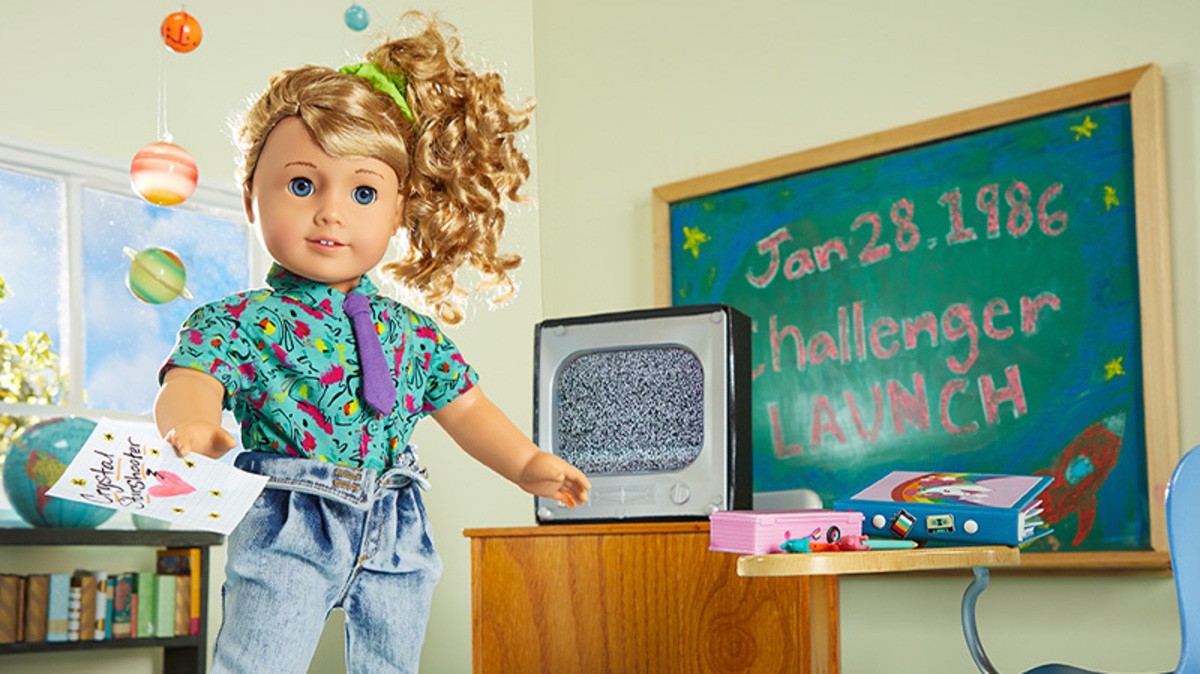The New American Girl Is Designed to Get Girls Into STEM (and Make Us All Feel Old)

Sometimes a doll is more than a doll. And in the case of the latest addition to the American Girl Doll collection, Courtney Moore, she’s more than just a toy who costs $110 and is meant to inspire kids to beg their parents to drop hundreds more on books and accessories. Like all the American Girl dolls and their accompanying books, she’s meant to inspire and teach about the past. Courtney specifically is intended to get little girls to get into science and coding, which is awesome.
But she also makes me feel very old and very confused, given that Courtney’s “historical era” is 1986. There’s a lot to think about there, both good and bad.
For one, as you can see in the picture above, 1986 was a big deal for women in science. The 80s, according to the American Girls site, “included several female firsts, like Geraldine Ferraro as a vice-presidential candidate and Sandra Day O’Connor joining the U.S. Supreme Court—plus, Christa McAuliffe became the first teacher-astronaut.” Which is all true … but it sort of obscures that McAuliffe died terribly in the Challenger explosion and that Courtney is apparently going to get to experience that unique trauma … but that’s actually in line with the brand.
The American Girls books and stories always touch on darker aspects of history. Molly’s dad was serving in World War II, Addy escaped slavery, Nanea, one of the newer characters, is a native Hawaiian girl who experiences the attack on Pearl Harbor. These dolls teach kids about history and include the scary and upsetting parts, as they should. They make the world less scary for kids today by showing them that the world has always been scary and they’ll be okay.
But it still feels weird to have a doll representing a dark historical moment that still feels so recent. Also having a “historical” doll from the 80s makes me so very old. What I like a lot more is that Courtney is all about coding and science. The 80s were a big moment for women in coding, in fact. the early 80s was the biggest moment for women in that field. According to Slate:
The mid-’80s was a notable time for women in computer science—because that was when they started disappearing. From 1970 into the start of the 1980s, the percentage of computer science degrees conferred to women rose, peaking at 37.1 percent in 1984. But this number then dipped drastically, and we’ve never recovered.
Courtney loves video games (and you can buy a doll-sized Pac-Man arcade game for her) but wants to see more girls in the games, so she starts to code on her own. And I honestly love that, and the message it can send to kids.
But also, there are elements here that are still a bit mind-bending …
The fact that the character Courtney owns an original 1986 Molly doll means that the American Girl Company is canon within the American Girl universe. History has caught up with itself. The cycle is complete. This Ouroboros has swallowed its own tail. pic.twitter.com/PB3LUQHHQB
— Audrey Dubois (@PlatypusInPlaid) September 16, 2020
This is particularly upsetting, given that Molly isn’t for sale currently on the actual American Girl site!
But also: yes.
the new american girl doll courtney is def a lesbian pic.twitter.com/tX9eKSjOF2
— whyat smiff (@drwillysmooth) September 15, 2020
I’M CRYING 😭@American_Girl IS FINALLY GIVING ME MY GAY NIECE FROM THE 80S
WHEN DOES COURTNEY RELEASE?!
SHE AND I WERE MEANT TO BE IN YOUTUBE VIDEOS TOGETHER— SAVY (@SavyLeiser) September 11, 2020
There is now more attention than ever as to concerns about diversity and inclusion in the American Girl line. The company issued a statement and made a commitment to do better in this area back in June, which read in part:
Moving forward, American Girl is committed to bringing in more Black voices to our development process, working with consultants, influencers, parents, and girls who can advise us across product, content, and programming. As a result, we will dedicate our resources to developing more diverse doll options, including creating a new contemporary Black character, as well as other contemporary characters of color.
Hey AG, I know Courtney was probably in development for awhile and I’m excited for an 80s doll! But it is pretty disappointing that your first release after your diversity commitment is a white doll :(
— mom says its my turn to own the bi flag (@TheSaraRenee) September 15, 2020
It is worth noting that of the 12 Historical American Girl dolls on sale right now, five of them are BIPOC (Melody, Nanea, Addy, Josephina, and Kaya), and Rebecca is Jewish.
Going forward, we hope to see a lot more representation by American Girl across the ages. But we’re glad that Courtney is bringing an important message with her debut. A gamer girl who refuses to be hemmed in by what seems to be a “male field,” who loves to code, and has a pretty awesome style all her own …
The new American Girl doll, Courtney, is an AESTHETIC. She has ALL the neon and franchise merch (Pac-Man, Care Bears). Also she dreams of being a game developer as she’s the local arcade’s Pac-Man champ.
I have a lot of emotions about this. pic.twitter.com/8j5DDiTqzP
— as Brak asked: what day is it?? (@pinba11princess) September 15, 2020
Okay, we can get behind it.
(Image: American Girl)
Want more stories like this? Become a subscriber and support the site!
—The Mary Sue has a strict comment policy that forbids, but is not limited to, personal insults toward anyone, hate speech, and trolling.—
Have a tip we should know? tips@themarysue.com